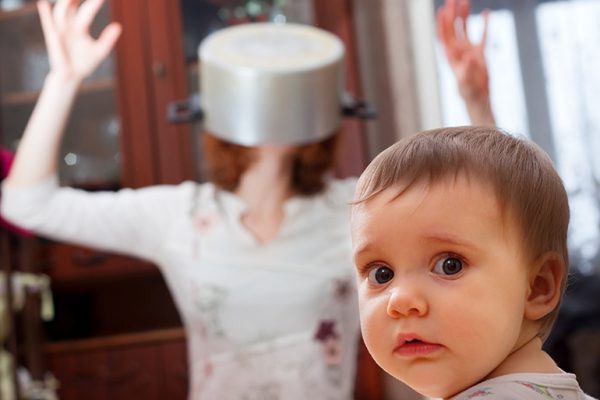Where does emotional burnout begin?
Planning a pregnancy, reading books and attending motherhood courses do not help prepare you for caring for a baby. Sooner or later you have to face the fact that this is, first of all, lack of sleep and a constant struggle with dirt, smeared porridge and scattered toys.
And if this is not the first child, then a feeling of “Groundhog Day” arises. Especially if one of the parents is constantly at work, and relatives cannot help.
This situation is fertile ground for the formation of burnout syndrome. Initially, psychologists believed that only social workers faced such a problem: doctors, teachers, service personnel.
But it turned out that every mother on maternity leave is also at risk due to:
- constant psycho-emotional stress;
- lack of sleep;
- lack of time for yourself;
- reducing your social circle.
The situation is aggravated if there are frequent quarrels and scandals in the family, there is not enough money, or the child requires additional care, for example, if he is allergic or hyperactive.
Among other reasons for emotional burnout, psychologists note:
- Late maternity leave , when the expectant mother worked until the moment of birth.
- Difficult pregnancy , the need to remain in confinement for several weeks, worrying about the health of the baby.
- Difficult birth and long rehabilitation period.
Having noticed such situations in your life, you should pay special attention to your own well-being, so as not to become like a squirrel in a wheel.
The holy of holies of almost every mother is “stroller” friendship
Be selective here. If you feel that the essence of communication comes down to a discussion of who hasn’t gotten enough sleep, or who’s husband isn’t helping anymore, it’s better to protect yourself from such destructive contact.
Such meetings take up time, energy and hinder development. Not to mention the fact that you constantly need to adapt to the regime of not only your child, but also your friend.
Recently, while walking in the park, I saw a mother with a stroller. The baby was sleeping, and she, covering her legs with a stylish blanket, was reading the now popular book “Ni Si”. And a little further away stood two mothers with their strollers and discussed prices at a discounter. Such is the contrast. They were even different in appearance from their previous mother: plump and unfashionable)). Lifestyle and range of interests affect everything, whether we like it or not.
There is quite a bit of communication for a mother on maternity leave, so it must be of high quality . Let this be a purposeful, like-minded friend, and not a semi-literate gossip.
In general, we have the power to change our lives. Some people will cite a hundred hundred reasons for the rest of their days, while others look for ways to make the most of any given situation.
What kind of people will you be, huh?
Author: Irina Bogatka
How does emotional burnout manifest?
Prolonged psycho-emotional stress depletes the body's resources. That is why the first and most striking sign of a problem is chronic fatigue.

Usually it is attributed to lack of sleep, poor diet and 1000 other reasons.
However, if in the morning after 8-10 hours of sleep you still feel exhausted, this is an alarming signal.
It’s worth taking a closer look at yourself and looking for other signs of emotional burnout:
- The world has become gray and joyless.
- You give up, you don’t want to do anything.
- I am haunted by a feeling of loneliness and uselessness.
- I want to hide from the whole world.
- Children, friends and loved ones cause irritation.
- Any stress, even a small childish prank, makes tears well up in your eyes.
- Criticism is perceived very painfully.
- The feeling of guilt “blooms” rapidly.
Symptoms do not appear all at once or suddenly. They form gradually, over several weeks and even months.
Mom on maternity leave: Trick No. 4
The pleasure of communication One and a half and even three years fly by unnoticed. The baby starts going to kindergarten, the mother goes to work. Communication with the child is limited to a few hours a day.
Therefore, try to learn to enjoy every minute spent with your baby . It’s so cool to see how he sat down for the first time, took a toy in his hand, and said “mom” for the first time.
Involve dad in your friendship with your baby. In the evening, arrange moments of togetherness for your family. Lie on the bed together, kiss the baby and each other, share your impressions of the past day, make plans for the future and dream.
The period when a mother is on maternity leave is not a test of strength. This is a time to strengthen the family, establish strong, trusting and tender family relationships.
Stages of development of a dangerous condition
Psychologists distinguish several stages in the development of emotional burnout.
First stage. Voltage
Despite chronic fatigue, duty to children forces me to get up at any time of the day or night. However, duties begin to be performed mechanically.
Because of the feeling that something is constantly not being done, there are attempts to streamline life, to introduce a certain routine and rhythm for the whole family.
But any deviation from the invented schedule, even a sudden invitation to a holiday, already causes irritation.
Gradually, the “small joys of life” cease to bring pleasure. The endless race begins to complete household chores perfectly. But chaos and disorder constantly win, which is why a feeling of guilt “wakes up” and an inferiority complex is formed: “I’m a bad mother!”
Fighting methods
At this stage, the problem of psycho-emotional overstrain can be solved by communicating with loved ones who will support and assure that everything is fine.
Don’t forget about regular rest, setting aside a couple of hours for yourself to watch a TV series, take care of your skin, or do your favorite hobby.
For this reason, you can put aside your usual tasks: don’t wash the floors today, don’t cook dinner, and eat pizza.
Second stage. Apathy
In place of constant tension comes emotional emptiness. If previously a puddle on the floor, scattered socks and toys caused irritation, now only tears amid a feeling of hopelessness.
At the same time, it becomes impossible to rest. Neither sleep, nor favorite activities, nor communication bring relief. I just want to hide under the blanket and not see anyone. Attempts to help from loved ones only cause anger and the feeling that these people do not understand anything.
Fighting methods
At this stage, you already need the help of a neurologist. Your doctor will give you a list of foods and medications that support your nervous system, such as B vitamins.
This brain boost will help you gather your remaining strength and overcome emotional burnout before the situation gets worse.
Third stage. Destruction
The brain, trying to protect itself from the constant pressure that stress and guilt exert, uses a “fuse”. If it is no longer possible to withstand aggression directed at yourself, you need to switch it to another goal.

So all the accumulated negative emotions result in uncontrollable outbursts of anger towards the child and loved ones.
At best, these are screams, scandals and endless lectures. At worst, physical violence begins.
A mother can throw the child on the bed, start shaking him to calm him down, or hit him. Every day the aggression will only increase.
Fighting methods
In this situation, it is no longer possible to do without a qualified psychologist and support from a neurologist.
Only the joint work of specialists will help restore the functioning of the nervous system and correct the mother’s behavior.
Mom on maternity leave: Trick No. 2
Convenient daily routine When the baby adheres to a certain routine day after day, a mother on maternity leave can make her own plans.
Ask your pediatrician at what age how many times and for how long your child should sleep. Create a routine for his day and keep it in plain sight, for example on the refrigerator door. Try to stick to the accepted schedule and not get lost. Of course, all babies are very different, but usually they get into the routine very easily and begin to enjoy the routine themselves.
Oriental medicine specialists believe that children should adhere to something like this:
• 07–09 — waking up, washing, exercises (or light massage), breakfast; • 09–11 – walk; • 11–13 — lunch; • 13–15 – afternoon snack; • 15–18 — dinner; • 18–20 – walk; • 20–21 — bathing, second dinner, sleep.
The number of naps and additional feedings will be distributed within this schedule. Knowing what time the baby sleeps, you can invite a friend for tea, make an appointment with the hairdresser (asking the grandmother to sit with her sleeping grandson), or simply lie down to rest next to the baby. In addition to convenience for parents, a “regular” child usually sleeps much better and longer, and is less capricious. Please note that we are not talking about feeding the baby strictly according to the clock or putting him to bed, say, exactly at 16.15, even if he woke up not long ago. But a very approximate daily routine makes life easier.
How to prevent emotional burnout
First of all, you need to accept the idea that a child cannot grow up happy and healthy without a mother. Therefore, you need to devote no less time to yourself than to the baby.
Only a joyful and full of strength mother can give children everything they deserve. Considering that stress and lack of sleep cannot be ruled out, it is important to change your attitude towards motherhood.

This is the easiest way to prevent emotional burnout in women:
- Forget about perfectionism. Not all things are equally important. If your home clothes are not ironed and your husband eats dumplings one evening, nothing bad will happen. You just have to accept that it’s impossible to do everything perfectly.
- Ask for help. Only the mythical Supermom can independently raise children, cook, clean, do laundry and stay active 25 hours a day. It will be much easier for an ordinary woman if close people periodically help her. This way you will have time for yourself.
- Don't compare. If someone’s child began to crawl, talk and sit on the potty earlier, then one can only be happy for these people. Each baby is unique and develops in its own way, regardless of what happens in other families and is written in books. Comparing it is harmful - it is only a reason for stress, which should be avoided.
- Do not pupate. Motherhood is only part of life. In a few years, children will grow up and have their own interests and activities. They will achieve much more if they see in their mother an example of how they can do what they love and communicate with people, despite the duties of a “hearth keeper.”
- Do not be afraid. Concern for your child is normal, but it should not develop into panic. If this happens, then you must definitely tell about the disturbing things to a person you can trust, and together figure out what can be done.
Emotional burnout only occurs when a mother demands too much from herself and her child.
If you can’t lower the bar of expectations on your own, then you should look around, talk to other parents on playgrounds and in stores, on forums and on social networks. Having learned about how other people live, it is much easier to determine for yourself what is really important and requires maximum effort, and what responsibilities can be neglected in order to take time to restore your own mental strength.
Maternity leave and depression among women seeking meaning in life
He screams all the time, it's just hell. I want to close my ears and never hear it again. Life turned into a nightmare with maternity leave. Depression sucks me in like a black hole, and I simply stop finding any meaning in everything I do. Do I really exist only to wash these endless undershirts and prepare concoctions? What's the point of this? And when my screaming bundle grows up, will he also live only to pay for food for the next screamer and wash his pants? Sometimes it seems to me that it’s not a matter of maternity leave, my depression is completely justified by the meaninglessness of human life as such.
Women with a sound vector can experience real depression while on maternity leave. Their most sensitive area is the ear, and their natural need is solitude and concentration.

When caring for a baby, such women can really experience severe pain from a child's cry, since it directly affects their most sensitive area. And the inability to be alone in silence and concentrate on your thoughts further intensifies bad conditions.
In addition, any sound student, regardless of gender, strives to understand the meaning of life: both his own and that of all humanity. Being aspired to the metaphysical, the owner of the sound vector often perceives with disdain everything that has to do with the physical world. For example, even the needs of your own body: the need to cook and eat something, earn a living, wear something. And a small child seems to embody precisely the aspects of physical existence: a newborn can only eat, drink, breathe and sleep.
If a sound woman does not realize her aspirations for self-knowledge, does not find use for herself in useful social activities, then she accumulates severe sound voids and shortcomings when she goes on maternity leave. Depression can get worse and become very severe. Doctors often prescribe antidepressants or other drugs in such situations, sometimes even incompatible with breastfeeding.
The sound psyche has the largest volume, therefore it is currently not filled with any previous sublimants (religion, esotericism, interest in science). But there is a way out of depression. A sound artist can fill his shortcomings through awareness of the structure of the human psyche; precise knowledge of this is revealed in the system-vector psychology of Yuri Burlan. Listen to what Tatyana says about her experience of completing the training:











